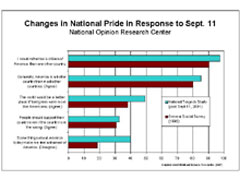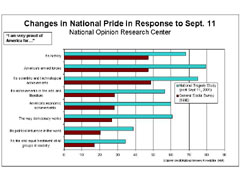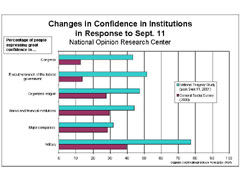(from the National Science Foundation news release, here)
Public Bounces Back After Sept. 11 Attacks, National Study Shows
Confidence levels at 30-year high
|
Americans responded with resilience to the events of Sept. 11, registering large increases in their feelings of national pride, confidence in many institutions, and faith in people, according to the National Tragedy Study by the National Opinion Research Center at the University of Chicago. The study, publicly funded by the National Science Foundation, and privately by the Robert Wood Johnson Foundation and the Russell Sage Foundation, also contrasted public response to Sept. 11 with response to the 1963 assassination of President John F. Kennedy (also studied by NORC). People reported a large drop in their normally positive feelings toward life after the Kennedy assassination, but reported few similar responses after Sept. 11, Smith found. "Emotionally, Kennedy's assassination seems to have had a larger impact on psychological well being than the terrorist attacks," said Tom W. Smith, Director of the General Social Survey (GSS) at NORC and co-author of a report on the findings, "America Rebounds: A National Study of Public Responses to the September 11 Terrorist Attacks." Researchers found a much stronger feeling of anger after the Sept. 11 attacks than after the 1963 assassination. In 1963, people reported feeling ashamed as well as angry; however, feeling ashamed was not a strong response to the terrorist attacks. The study, which measured a wide range of attitudes and included an over sample (special survey) for New York, was based on random telephone calls to more than 2,100 U.S. residents in the two weeks following Sept. 11. The results were compared with similar questions asked recently on the GSS, a continuing study of American values, attitudes and behaviors on a wide variety of subjects. The GSS provides a baseline for American opinions and is used extensively by social scientists to chart and study changes in public perceptions. "We found, with the exceptions of New Yorkers, that Americans appear to have had weaker physical reactions to the recent national tragedy than to the Kennedy assassination," said Kenneth Rasinski, a co-author of the report and senior research scientist at NORC. For instance, 68 percent of people felt very nervous and upset as a result the 1963 tragedy, compared with 51 percent in 2001. While 57 percent of the people reported feeling dazed and numb in 1963, 46 percent had a similar response in 2001. In contrast, 60 percent of the people in 2001 reported crying, compared to 53 percent in 1963. |
|
Researchers asked about 15 physical and emotional symptoms and found 11 of these symptoms were reported by a significantly higher proportion of New York City residents than by the rest of the nation. According to Rasinski, New Yorkers were more likely to have felt very nervous and tense, cried, had trouble getting to sleep, not felt like eating, felt more tired than usual, had rapid heartbeats or headaches, lost their temper more than usual, had sweaty and clammy hands, felt dizzy at times, and felt like getting drunk.
Among the findings contrasting post-Sept. 11 attitudes with earlier General Social Surveys:
- Increased faith in fellow citizens. 67 percent (up 21
percentage points) said that most people are helpful, and 63 percent (up
12 percentage points) said that they felt people in general are
fair.
- Increased confidence in selected institutions. 77 percent (up
27 percentage points) had a great deal of confidence in the military,
compared with 61 percent in 1991 during the Gulf War. Confidence in the
executive branch tripled to 52 percent. People also expressed more
confidence in organized religion, corporations and Congress. This was
the highest confidence level in these areas in nearly three
decades.
- Increased feelings of national pride. 97 percent (up 7 percentage points) felt they felt they would rather be citizens of the U.S. than of any other country.
Other findings of the National Tragedy Study:
- Stronger reactions in New York. Residents of New York were
more likely than the nation as a whole to report feeling very nervous
and tense. They also reported crying more often.
- Positive action. 49 percent made contributions to charities, and 24 percent donated or tried to donate blood.
Other findings comparing the Sept. 11 attacks to the 1963 assassination:
- More prayer. 84 percent reporting saying "special prayers,"
compared with 75 percent in 1963.
- Television as a key source. 37 percent first learned of the Sept. 11 events from television, while 24 percent learned of the 1963 tragedy that way. In 1963, 36 percent learned of the assassination by personal contact; in 2001, 15 percent learned it that way.
-NSF-
![]()



